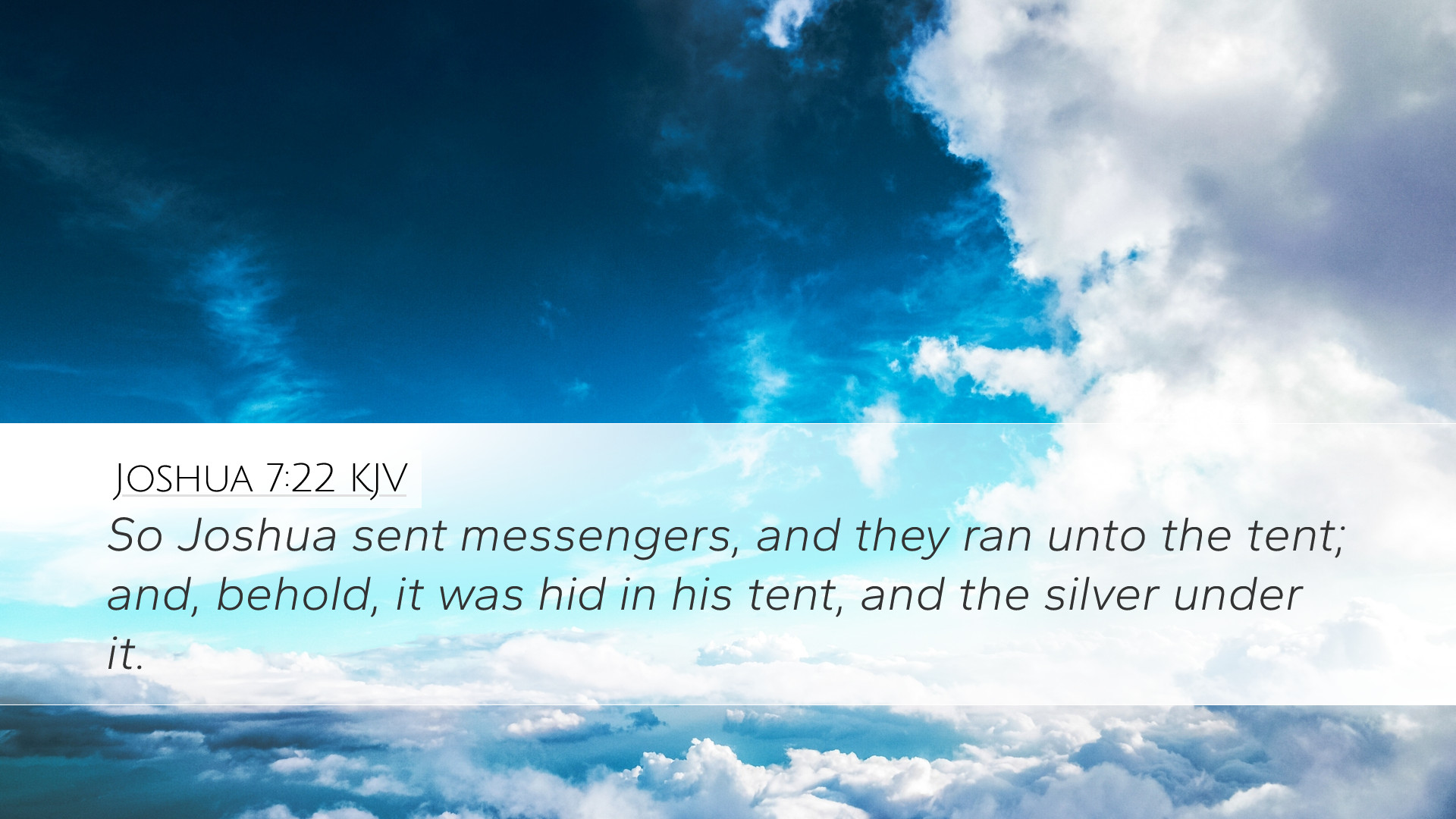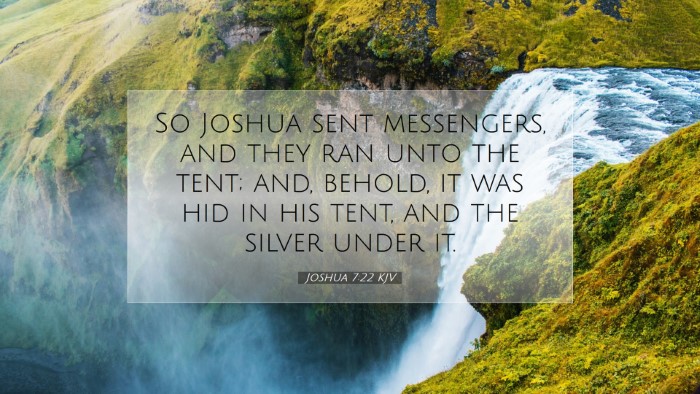Bible Commentary on Joshua 7:22
Joshua 7:22 (KJV): "So Joshua sent messengers, and they ran unto the tent; and, behold, it was hid in his tent, and the silver under it."
Context and Background
The passage comes from a pivotal moment in the history of Israel as they are in the process of conquering Canaan. Following their victorious capture of Jericho, the Israelites suffered a defeat at Ai due to the sin of Achan, who disobeyed God's command by taking spoils that were devoted to destruction. This chapter illustrates the gravity of sin within the community and demonstrates God's holiness and justice.
Analysis of Key Themes
- The Nature of Sin: Achan's transgression reflects the insidious nature of sin which can infiltrate the community of believers. Matthew Henry emphasizes that individual sin affects the collective, warning that one man's disobedience can bring disaster upon many.
- The Consequences of Disobedience: Following Achan's sin, Israel faced defeat, teaching that God’s favor cannot rest on a disobedient people. Albert Barnes notes that the defeat signals the necessity of holiness for military and spiritual success.
- The Role of Accountability: This narrative highlights the importance of accountability within the community of faith. Joshua’s proactive approach in sending messengers demonstrated effective leadership, a point echoed by Adam Clarke, who underscores the necessity of swift action against sin to restore the community.
- God’s Justice: God’s revelation of Achan’s sin demonstrates His unwavering justice. God's methods in revealing sin serve as a reminder to the faithful that He sees all, regardless of human efforts to conceal wrongdoing.
Detailed Commentary
Achan's sinful act of taking forbidden items from Jericho created dire consequences not only for himself but for the entire nation. The sin was publicly acknowledged, leading to a loss of confidence in God's support, which the Israelites desperately needed when facing Ai. The gravity of this incident stresses the need for obedience to God's commands.
When Joshua sends messengers to investigate Achan's actions, this swift response is indicative of the urgency required when sin is detected. The text states, "they ran unto the tent," capturing the immediacy of the situation. Henry notes that this haste signifies the dread that sin invoked among God's people, inspiring a need for swift rectification.
Moreover, we see the importance of transparency before God. Achan hid the spoils beneath his tent, symbolizing an attempt to conceal his wrongdoing. Clarke emphasizes that hiding sin leads to destruction, as this act was a direct violation of God's commands. No matter how skillfully one attempts to conceal their sins, they inevitably come to light, as God reveals hidden things to reveal His righteousness.
Theological Reflections
The theological implications of Joshua 7:22 extend into the New Testament, urging believers today to reflect on the nature of their own sins and how they impact the collective body of Christ. This passage speaks to the necessity of confession and repentance in a believer’s life. It remains essential for the Church to recognize the gravity of disobedience and the communal aspect of sin.
Just as Achan's sin led to the judgment upon Israel, so too can unrepentant sin within the Church today hinder spiritual progress and collective blessings. Thus, the Church is called to a holy life, attentive to God's laws and the seriousness of moral failure.
Practical Applications
- Encouragement to Confess: Believers are encouraged to confess their sins, recognizing that isolation or secrecy can have broader repercussions on the community.
- Community Vigilance: Faithful communities must remain vigilant against the small compromises that can lead to greater failures. The accountability that comes from mutual support is crucial.
- Leadership Responsibility: Leaders within the Church should take responsibility for guiding their flocks in holiness and integrity, as Joshua did, setting an example of righteousness and vigilance.
- Hope in Restoration: While the narrative surrounding Achan’s sin is grave, it also ultimately leads towards a pathway of restoration and hope; understanding that while sin has consequences, God's mercy is available to those who repent.
Conclusion
Joshua 7:22 serves as a potent reminder of the seriousness of sin, the impact on the community, and the necessity of God's holiness. It calls God's children to a place of both introspection and action, ensuring that sin does not remain hidden but is brought forth in repentance and confession. As pastors, students, theologians, and Bible scholars delve deeper into this scripture, may they uncover profound truths that lead to greater faithfulness and dedication to God's righteous standards.


